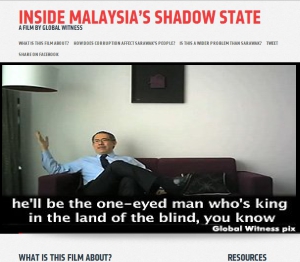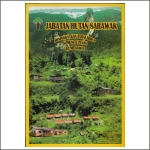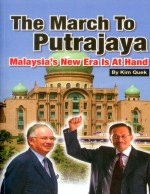
M Jegathesan
Alcoholism, drug use, and crime among the indigenous people in Sarawak on the increase and anger is rising over continuing encroachment on native lands.
Tribal chief Danny Ibang lived most of his life in the pristine jungles of the Malaysian portion of Borneo island until he was pushed into a modern world he was told would be better.
And in many ways, it is.
His Kenyah community of 2,000 enjoys electricity, running water, health and educational facilities previously undreamed-of since being moved out of the jungles to a new village to make way for the huge Bakun hydroelectric dam.
But as expanding dams, oil-palm plantations and other development force thousands off ancestral lands in the state of Sarawak, a host of modern new problems threaten to break down once tight-knit tribal communities.
Village elders and activists say alcoholism, drug use, and crime are on the increase and anger is rising over continuing encroachment on native lands.
“There have been a lot of social changes after the Bakun dam,” said Ibang, 66, whose people were among the first moved to the relocation village of Sungai Asap 14 years ago.
“Some teens who go to school learn to rebel against their parents, and boys and girls now mingle freely as they see it on the television,” he said. There were 10 recent teen pregnancies – something unheard-of in the old days.
The state government is pushing to develop the economy of Sarawak, which is blessed by rich natural resources yet remains one of Malaysia’s poorest states.
‘We are really angry’
But critics say the effort, while necessary, is plagued by graft and harms tribes that are ethnically distinct from the nation’s majority Malays.
Tribal lands make up about 80 percent of Sarawak and “nearly all has been taken for logging and plantations”, said Mark Bujang, head of Borneo Resources Institute, a body working in defence of native land rights.
In October, Penan tribespeople blocked roads into their lands for a week to protest logging and alleged river pollution by Malaysian firm Interhill until the blockade was dismantled by authorities.
At a forum on native concerns in the town of Bintulu in October organised by the Human Rights Commission of Malaysia, about 150 Iban tribespeople alleged a palm oil company illegally seized their land for a plantation and disturbed ancestral graves, said Joseph Laja, an Iban.
“We are really angry,” Laja told commission members.
“If they move into another part of our land, there could be violence.”
About four million of Malaysia’s 28 million people belong to indigenous tribes, most of which are native to Malaysian Borneo where some retain diminishing traditional rainforest hunting and farming ways.
Officially, they enjoy the same preferential treatment in business, education and other areas accorded to Malays – a controversial policy meant to lift Malay socio-economic standing.
But natives and activists say this has meant little to tribes, who remain among the country’s poorest groups.
As a result, many youths welcome their new life and opportunities in Sungai Asap, which now has 11,600 people from a range of tribes living in traditionally inspired longhouses.
White elephant
 Roads linking the village to coastal cities have, along with modern telecommunications, opened new employment vistas for tribal youths.
Roads linking the village to coastal cities have, along with modern telecommunications, opened new employment vistas for tribal youths.
“I love living in Sungai Asap,” said Lenny Prescially, 18, as she tapped out messages to friends on Facebook in a local community centre.
Her family moved here from the jungles when she was four and she knows little of the old ways.
“Only the elders want to continue the old lifestyle. They don’t know anything,” she said dismissively of the older men who still hunt wild boar in forests and nearby palm plantations, machetes strapped to their waists.
The Bakun dam has been widely criticised as a white elephant, disastrous for uprooted tribes and pristine jungles that are now inundated by a reservoir the size of Singapore, its projected power output exceeding Sarawak’s needs.
Transparency International has called the dam, which began generating electricity in August, a “monument to graft”.
Much of the anger in Sarawak is directed at Chief Minister Abdul Taib Mahmud – himself from the Melanau tribe – who has governed the state since 1981 and is widely accused of corruption, cronyism, and plundering the state’s resources, which he denies.
But Sarawak Land Development Minister James Masing said the state must develop the economy and give youths new opportunities.
“I have to support (the state’s youths). We need to develop Sarawak,” he told AFP.
But there is a palpable sense of rootlessness today for communities whose identity was long linked to ancestral lands passed down through generations.
“When our land is taken away, there is no longer any blood in our body,” said Sungai Asap resident Stem Liau, 48.
Ibang, the Kenyah headman, said his people were promised eight hectares (20 acres) of farmland per family at Sungai Asap but only received a little more than one hectare of poor-quality land.
“Promises have been broken,” said Ibang, who has struggled to grow pepper, cocoa and rubber.
Hasmy Agam, chairman of the rights commission, said it had received nearly 2,000 complaints over native land rights infringement in Malaysia over the past decade. Many of those complaining have threatened violence.
“We sense that. We hope that is not the solution,” Hasmy said.






















MP: Be more sensitive to Penans’ needs !!!!!!!!!!
The Star, Saturday February 5, 2005
KUCHING: Outsiders such as loggers and plantation workers should be more sensitive to the needs of the 3,000-odd nomadic Penans in Belaga district, Ulu Rajang MP Billy Abit Joo said yesterday.
“Logging activities and conversion of large forested areas for oil palm plantations have affected the way the Penans organise their economic and everyday activities,” he added.
Joo, who visited several Penan settlements recently, said the interaction between the Penans and outsiders might have played a part in the recent measles outbreak in the district.
The outbreak has killed 17 Penan children and an adult from Long Urun, Long Menapa and Long Singgu in the Murun River basin.
In the 1970s, there were less than 1,000 Penans living in settlements in Belaga district. The number increased over the years as more nomads gave up their roaming life in the jungle.
Joo said the Penans need a helping hand to change at their own pace.
“They need new longhouses, water supplies, food supplements for the children, expert agricultural guidance and new service centres at the Danum, Pileran and Seping Rivers.”
___________________
RM400 million asset division stalls divorce for Taib’s son ?????
By Hafiz Yatim, Malaysia Kini, 27 Jun 2011
There was a brief, tense moment in the Kuala Lumpur Syariah High Court today during the divorce settlement proceedings of the Sarawak chief minister’s son Mahmud Abu Bekir Taib after the distribution of assets was brought into question.
Lawyers representing his former wife Shahnaz A Majid, the sister of jazz queen Sheila Majid, asserted they had served the necessary discovery documents on Shahnaz’s claim of RM400 million from the son of the Sarawak strongman.
One of the documents Shahnaz’s lawyer Dr Mohd Rafie Shafie claimed to have handed to Bekir is an ex-parte order obtained from the court, dated May 9, calling for a discovery of Bekir’s assets in Malaysia and abroad.
He said a discovery of the assets, which his law firm and co-counsel Akbardin Abdul Kader had made, was also handed to Bekir (left).
Rafie claimed that Bekir did not want to receive their letter and documents when a representative went to his house in Desa Nusantara, Sri Hartamas, on June 22, forcing his maid take it instead.
“Our representative went to Bekir’s house at Duta Nusantara, Sri Hartamas, on June 22. However, Bekir did not want to receive our letter and documents and instead his maid received it on his behalf,” Rafie said.
However, Bekir’s lawyers – Zainul Rijal Abu Bakar and Saadiah Man – denied that their client had received such a claim.
“Our client was at home the whole day and did not receive any documents. Under the law, the documents should have been handed directly to my client,” Zainul Rijal said.
No details furnished, say Bekir’s lawyers
Co-counsel Saadiah also said it was improper for Shahnaz to submit the ex-parte application as the order dated May 9 had elapsed.
Bekir, on the other hand, claimed his former wife had failed to give details of their joint matrimonial assets – for which she is staking a claim – preventing him from filing a defence.
This followed an interlocutory application filed by Bekir’s lawyers on June 23, asking Shahnaz to provide the details of the hundreds of acres of land in Sarawak that Shahnaz (right) is seeking.
“She is also claiming a stake in houses all over the country and outside Malaysia, but did not furnish details,” Zainul Rijal said.
“According to the law, those making such claims must provide the details of the assets the person is seeking, so that we can verify them. Not doing so will result in us not being able to reply.”
In light of these discrepancies, chief syariah judge Mohamad Abdullah ordered Shahnaz’s lawyers to hand over all the required documents to the lawyer instead of handing them directly to Bekir.
Rafie said it would take some time as he had made four copies that were handed over and now these had to be handed over again.
Mohamad fixed Aug 9 for mention, before which Rafie and his co-counsel are required to give the necessary documents to Saadiah. These would in turn be given to Bekir to verify and to prepare his reply.
Under the syariah law system, the claimants are required to furnish the details of the assets in a claim and the defendant or respondent will then verify whether this is legitimate.
Consolidatory gift claim re-filed
This is especially so if the assets could be in the name of others as well and not solely in the respondent’s.
In a related development, Shahnaz had re-filed the mutaah (consolidatory gift) claim on June 9, following the divorce pronouncement made by Bekir on May 9.
It was reported that Shahnaz is seeking RM300 million in matrimonial assets and another RM100 million in mutaah following the divorce. Bekir also submitted a separate divorce application.
The couple has a 17-year-old son.
Shahnaz, 48, claims that she and Bekir own residential properties in many places, thousands of hectares of land in Sarawak, and land in Bukit Tunku in Kuala Lumpur. They also have seven luxury cars that include the Lamborghini, Ferrari, Bentley and Maserati marques.
Their joint assets include shares in 15 companies, including Cahaya Mata Sarawak and Sarawak Cable Bhd.
The couple also possess assets in the form of savings, money in the Employees Provident Fund and Amanah Saham Bumiputera units. The detailed information on the assets will be presented during the hearing.
Shahnaz is claiming RM300 million in the joint assets accrued during marriage, which she is entitled to. She also wants Bekir to submit the original land titles to the court or to her legal representatives.
Comment by Kamus — December 2, 2011 @ 11:14 AM |
BN/UMNO is displacing not only natives..physically but mentally especially our children….try to brainwashed them with Islamic teaching.
Comment by HH2H — November 30, 2011 @ 6:50 PM |
DAYAKS ARE SARAWAK’S RED INDIANS FACING EXTINCTION
This is yet another other article which lays bare the consequences of the re-colonization of Sarawak since 1963. It all revolves around the loss of one’s territory.
The white man’s conquest and colonization of the US America’s west saw the defeat and annihilation of many Red Indian nations.
The remnant tribes were herded into “reservations” – in these “killing fields” of America condemned to live out a slow death. They lost their traditional “hunting grounds” and were deprived of their food sources and many starved and froze to death. Many tribal communities just disintegrated over time with social economic problems they never experienced before.
This was genocide.
Alcoholism caused by “fire water” was a major one and with that followed other problems such as relationships breakdown and lost of will to involve in economic activity for their survival. The worse aspect was being forced into a white man’s money economy. They could not survive in this new system.
The Dayak Nation like the Red Indians is now facing very similar problems created by mass dispossession from their land created by an anti-people government working in favour of private commercial logging companies linked to those in power.
For the Red Indians the line was drawn between Red landowners and White colonizers. They fought bravely and heroically but lost the fight.
The Dayaks were confused by the new rulers who replaced the white masters as they were the same colour people who now became their new masters. They are still numbed by what happen and are only beginning to fight back.
The new colonialism was disguised as “independence in Malaysia” and enforced by under the unequal “Malaysia Treaty”.
Dayak leaders like Temenggong Jugah, although expressing deep concerns were nevertheless misled by the departing British and incoming Malayan leaders into believing that not only their rights would be preserved by enhanced by “self-rule”
Tungku A Rahman stated in writing to re-assure Sabahans and Sarawakians that in Malaysia they would enjoy freedom self-determination and be treated equally and enjoy economic advancement. They were not being re-colonized.
A Sabah politician Jeffrey Kitingan in a recent article made the following comments. [The article may be read in full on this link:http://despiritofsabahan.blogspot.com/2011/09/sept-16-is-black-day-for-sabah.html ]
“Tunku’s assurances
—————————–
Doubts and concerns expressed by the Borneo leaders to the status of Sabah and Sarawak in the Federation were
subsequently addressed by Tunku Abdul Rahman and his team when they agreed to take into consideration the 20-Points conditions.
Tunku Abdul Rahman assured that “The granting of self-government too would enable Sabah to stand on its own feet as equal with Malaya, Sarawak and Singapore”.
“The important aspects of the Malaysia Ideal, as I see it, is that it will enable the Borneo territories to transform their present colonial status to ‘self-government’ for themselves and absolute independence in Malaysia simultaneously..”
“The days of imperialism are gone and it is not the intention of Malaya to perpetuate or revive them. When the Borneo territories become part of Malaysia, they will cease to be colonies, they will be partners of equal status, no more or less than the other states.” (the ‘other states’ refer to the other states’ entities of Malaya, Singapore and Sarawak).
Thus what eventually convinced the Borneo states leaders to form Malaysia beside the question of security, were the assurances that the merger would be that of equal partnership of the signatory states (Malaya, Singapore, Sabah and Sarawak) to the Malaysia Agreement, the autonomy and special rights accorded to Sabah and Sarawak under the 20-Points, Inter-Governmental Committee (IGC) Report and the Malaysia Agreement itself.
Have all these Agreement, promises and assurances been fulfilled? Is Sabah now secure and enjoying “absolute independence” in Malaysia? Are we now in control of our economic resources, our political franchise and our future? If the answer is “NO” then what are we celebrating on the Sept 16?”
—————————————————————————————————
Every informed person at the time should have seen the contradictions in his promises. These were made while Malaya was caught up in the CPM’s Malayan National Liberation war for Malayan independence when all civil liberties were suspended by emergency law.
This situation was repeated in Sarawak when the Brunei Uprising broke out in December 8 1962 and the British declared a state of emergency which continued with the NKCP guerrilla independence war in Sarawak till 1990 and till today without being lifted.
The re-colonization of Sarawak and Sabah saw similar political and social economic impact on the native people who were disadvantaged by a different cultural life style and lack of education and experience in a money economy.
The new governments (state & federal) were led by men who were mainly concerned with plundering the wealth of the land in collaboration with the new Kuala Lumpur master. It was captive situation whereby they totally controlled the situation and plundered at will under the series of “economic development plans”.
These plans were usually preceded seizure of land for timber logging causing thousands of rural dwellers to be evicted from their traditional land and source of livelihood on under SALCRA Dayaks parted with their land willingly and discovered they did not get what they bargained for. One was the blatant land grab approach. The other was a plan which turned out to be a deception even though it may not originally designed to robbed the landowners.
The problems of alcoholism, drug abuse and rise in crime are all problems which were comparatively rare in the past. Dayaks involved with their with working and hunting on their land did not have that sort of idle time to engage in social abusing activities.
The fact that Dayaks could easily be misled by their own leaders made it easier for the thefts of their land to be accomplished. In the USA the Red Indians saw clearly who their enemy was and they fought back. There were many historic wars and battles. In Sarawak Dayak ancestors also fought back against Brooke territorial expansion.
The Brooke expansion had a less inhumane solution – they simply classified as “reserved” the native land and and there the Dayaks tribes remained where they had been for centuries before.
They had a about period of 100 years of “land freeze” protection. This was lifted in 1963 with the unequal Malaysia Treaty which saw Sabah and Sarawak being handed over to Malayan UMNO rule the new colonial master.
The Dayaks were sold out by their new overseas educated leaders for self enrichment in cahoots with the new ruling elite led by Rahman Yakub and Taib Mahmud who were UMNO proteges.
Today all Dayak tribes and other traditional landowners face extinction of their landownership by official decree and extinction of their traditional way of life and cultural practices and skills which in retrospect must be seen as safer and more meaningful and rewarding than being entrapped into the precarious modern life-style discussed in the article.
———————————————————————————————————————————————————————————-
Serious readers can read many articles by googling in the Internet which similarly explore the issues raised above. There are many local websites dealing with these concerns.
Information should not just enlighten but must lead to action for many or us who are genuinely concerned about the fate of our country Sarawak and want to save it from gradual destruction by colonial plunder.
Comment by CHANGE4SARAWAK — November 30, 2011 @ 10:58 AM |
Modern day genocide by BN?
Comment by Salsa — November 30, 2011 @ 5:04 PM |